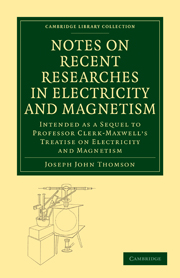 Notes on Recent Researches in Electricity and Magnetism
Notes on Recent Researches in Electricity and Magnetism Published online by Cambridge University Press: 05 August 2011
35.] The importance which Maxwell attached to the study of the phenomena attending the passage of electricity through gases, as well as the fact that there is no summary in English text books of the very extensive literature on this subject, lead me to think that a short account of recent researches on this kind of electric discharge may not be out of place in this volume.
Can the Molecule of a Gas be charged with Electricity?
36.] The fundamental question as to whether a body if charged to a low potential and surrounded by dust-free air at a low temperature will lose any of its charge, and the very closely connected one as to whether it is possible to communicate a charge of electricity to air in this condition, have occasioned considerable divergence of opinion among physicists.
Coulomb (Mémoïres de l'Académie des Sciences, 1785, p. 612), who investigated the loss of electricity from a charged body suspended by insulating strings, thought that after allowing for the leakage along the supports there was a balance over, which he accounted for by a convective discharge through the air; he supposed that the particles of air when they came in contact with a charged body received a charge of electricity of the same sign as that on the body, and that they were then repelled by it. On this view the molecules of air, just like small pieces of metal, can be charged with electricity.
To save this book to your Kindle, first ensure [email protected] is added to your Approved Personal Document E-mail List under your Personal Document Settings on the Manage Your Content and Devices page of your Amazon account. Then enter the ‘name’ part of your Kindle email address below. Find out more about saving to your Kindle.
Note you can select to save to either the @free.kindle.com or @kindle.com variations. ‘@free.kindle.com’ emails are free but can only be saved to your device when it is connected to wi-fi. ‘@kindle.com’ emails can be delivered even when you are not connected to wi-fi, but note that service fees apply.
Find out more about the Kindle Personal Document Service.
To save content items to your account, please confirm that you agree to abide by our usage policies. If this is the first time you use this feature, you will be asked to authorise Cambridge Core to connect with your account. Find out more about saving content to Dropbox.
To save content items to your account, please confirm that you agree to abide by our usage policies. If this is the first time you use this feature, you will be asked to authorise Cambridge Core to connect with your account. Find out more about saving content to Google Drive.